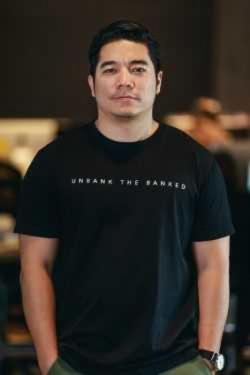
While Thailand is one of the most enthusiastic users of technology, especially social media, much of its most-used software is foreign-made. The country has yet to produce a single unicorn -- a startup worth US$1 billion -- despite the government's much-touted 4.0 scheme to bring Thailand into the digital age.
Thais use Line (Japanese) for messaging, Grab (Singaporean) for ride-sharing and Facebook (American) for nearly everything else.
But the current reality of a Thailand without any tech heavy-hitters may soon be coming to an end. Omise, a payment gateway startup, is looking to one day compete with payment titans like PayPal by creating a more seamless and secure online purchasing experience.
Founded in 2013, today Omise is one of the most well-funded startups in Thailand, and despite its founders' coyness, the company has the potential to be Thailand's first unicorn.
THE ORIGIN

Mr Ezra says Omise saw a 'big pain point' in the payment space.
Omise (pronounced oh-mee-say, from a Japanese word for shop) has a typical techie origin story. Two friends came together with an idea in 2013. One a university dropout and native Bangkokian, Ezra Don Harinsut, 37. The other, never-bothered-to-go-to-university Japanese expat Jun Hasegawa, also 37 and the chief executive of Omise. They met 18 years ago in Japan and have been friends ever since.
Instead of a garage, they came together at a Starbucks in Klong Chan to get their idea off the ground.
"In the beginning we didn't have the money to rent an office, so we would just buy a coffee and work from morning to evening," said Mr Ezra, who is the chief operating officer of Omise.
They chose Bangkok for its low cost of living and eclectic, multinational populace that brings a diversity of ideas and talents.
Their original plan was to build an e-commerce platform, but they ran into issues when looking for a way to process payments on their site.
"It turns out the entire market was looking for a better payment gateway, so we decided to pivot," Mr Ezra said.
Instead of building another e-commerce site, a market already relatively saturated in Thailand, they began building a payment service to be used on e-commerce sites throughout the region, one that could theoretically compete with existing legacy services like PayPal.
In 2014 the pair hired six employees, but they were running on a shoestring budget because they were self-funded at the time and had no experience raising capital.
As luck would have it, they found an angel investor. Through a friend of a friend they met Itthipat Peeradechapan, founder of Tao Kae Noi seaweed snacks, who helped get the nascent company off the ground.
HERE COMES THE MONEY
From there, the money rolled in at levels unusual for the vast majority of Thai startups. Omise first raised $300,000 from the Japanese firm East Ventures in 2014.
"The seed round was very difficult because we didn't have a product in the market, we just had prototypes," Mr Ezra said. "We told them the entire market had a big pain point around payment solutions, so they told us if we pivot and focus only on payment solutions, then they will invest in us."
In early 2015 they launched their payment gateway, opening the way to raising a further $2.6 million in 2015 in Series A funding, then $17.5 million in Series B funding in 2016.
2017 brought a Series B+ round and a partnership with Krungsri Finnovate. Most recently, in October 2018, the company raised an another undisclosed amount in B++ funding. In total they raised about $60 million, according to a company spokesperson.
Today, Omise employs about 170 people with offices in Tokyo, Singapore and Jakarta, with the head office still at the Crystal Design Center next to the Starbucks where it all began. The payment gateway is used by small and large companies alike, most notably in McDonald's Thailand's mobile app.
"More than 95% of [transaction] volume comes from enterprise merchants like telecoms, insurance companies, property management and automobile producers," Mr Ezra said. "We tend to go after local enterprises instead of global merchants, as the margins aren't that sexy."
He said the company is still running on VC money but hopes to become profitable by the end of 2019.
ICOs, NOT IPOs
Part of Omise's success is its early support for ethereum, currently one of most widely used cryptocurrencies besides bitcoin. Omise donated $100,000 to the Ethereum Foundation in 2014, the second company to do so after Microsoft.
The founders began looking into blockchain development of their own, spending about $1 million on a blockchain lab as an adjacent project to their payment gateway. This led to the creation of a cryptocurrency of their own, OmiseGO, described as a "scaling solution on the ethereum network".
"Our board of directors and VCs started to question us, asking why we were spending so much money," Mr Ezra said. "In 2017 we were planning to shut down our lab, but our board said if we could find a way to fund it ourselves without VC money, they were okay to keep it running."
They decided to fund the lab with an initial coin offering (ICO) in July 2017 out of Singapore -- like a public stock offering, but instead allowing investors to buy crypto tokens early at a set price. Omise raised $25 million with the ICO. They could have raised more, around $100 million, but decided to cap it at $25 million to "not be greedy".
The ICO was a huge success for the company, so much so that there are no plans for an initial public offering.
"IPOs are a bit old fashioned," Mr Ezra said. "There's tonnes of ways to raise money, different ways, more practical ways."
THAILAND 4.0
The government's Thailand 4.0 initiative was able to help Omise get talent and work with regulators. Through a programme by the Board of Investment, Omise and other software companies have easily acquired visas and work permits for foreign workers skilled in tech.
Unfortunately, according to Mr Ezra, the company has not been able to find all the necessary talent locally, especially developers, but foreign workers are being employed to help train local ones.
Omise also had to work closely with the Bank of Thailand, the primary regulator of payment gateways.
"The BoT has been really helpful and meets with us from time to time, showing them new tech and educating them," Mr Ezra said. "With new regulations they tend to discuss with us first to make sure if they make sense or would be a roadblock to growth."
Even so, the law was not too friendly to new technologies in the field. The Bank of Thailand is used to meeting with big banks, so the initial meetings in 2014 with six scruffy startup guys were "a bit awkward".
STARTUP CITY
"Bangkok is one of the places where blockchain people come and hide themselves," Mr Ezra said. "It's easy to find talented people from all over the world."
He said the food, cost of living and social life attract the sort of people that startups can use to innovate. Omise has hired more than 15 nationalities, bringing new perspectives and ways of doing things.
FIRST UNICORN?
"I think we were able to succeed because we did a product most people would think was too difficult to do," Mr Ezra said. "It's quite sophisticated, and not something typical for startups. Along the way we had so many roadblocks, but we didn't give up."
But as far as becoming Thailand's first unicorn, he shies away from the question, despite his startup having one of the largest VC war chests in Thailand.
"We're not looking to becoming a unicorn," he said. "What motivates me is not becoming a billion-dollar company, but doing something that benefits everybody. If I die and the company that I built is everywhere, like blockchain or the internet, that's much better than just a valuation, which is just a number."